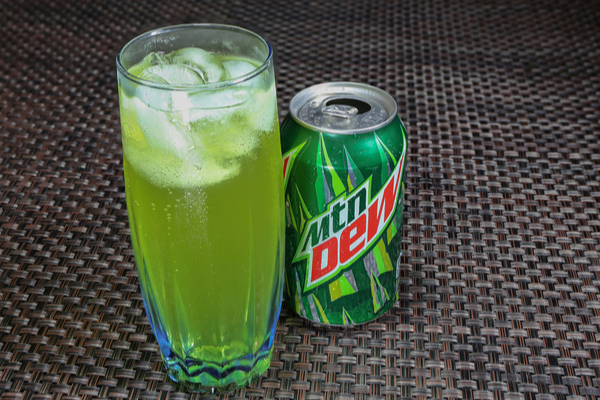If you would love to “do the Dew” but the high sugar content is keeping you away, your solution may just be close at hand. Mountain Dew launched a sugar-free version of its original soda nationwide on January 13th. PepsiCo, the brand’s parent company, said in the release announcing the drink that the flavor of the beverage will remain the same, just without sugar (not quite sure how they’ll manage that, but let’s keep an open mind).
The soda is called “Mountain Dew Zero Sugar and will be available in 20-ounce bottles, 2-liter bottles and 12 packs of 12-ounce cans. A 20-ounce serving will contain 133 milligrams of caffeine with a suggested retail price of $1.79. The sugar-free beverage will be sweetened with acesulfame potassium, aspartame and sucralose, FoodBev Media reported.
As volume sales of soft drinks have declined annually for more than a decade, soda giants like PepsiCo have been looking elsewhere for a jolt to their businesses. Rather than focusing solely on beverages, PepsiCo has been adding healthier snack options to its portfolio, which includes both Frito-Lay and Quaker Foods.
But soda is still big business for PepsiCo, and one that it needs to pay attention to in order to maintain its bottom line. While Mountain Dew is in many ways a regional beverage, it is also one that has been a big moneymaker for the soda conglomerate. The Motley Fool ranked the brand No. 4 on its list of best-selling sodas of 2018, since it commanded 7% of the soda market share for the past decade.
Although it is a recognizable brand for PepsiCo, it is also one that has gone flat in the last year. In the company’s earnings call in October, CEO Ramon Laguarta said Mtn Dew “is improving, but it’s not to the levels that we would like to see.” To work on that, he said the company would allocate additional resources to find the right innovative ideas, since revitalizing the brand “is a focus of the organization.”
The company’s first big step toward that appears to be this reformulation. Mtn Dew Zero Sugar is for consumers wanting to consume less sugar but still indulging in their preferred beverages. This could be a good move for the brand since a 2018 survey found 70% of U.S. adults are concerned about sugar consumption.
The branding for this launch echos Coca-Cola’s Zero Sugar beverage, which came out in 2017 to replace Coke Zero. When Coke chose to change its label to “Zero Sugar” and bring consumers’ attention to that word, it was more successful. Coca-Cola CEO James Quincey told The Wall Street Journal in October Coca-Cola Zero Sugar has grown 14% by volume globally in the first 10 months of 2019, while unit sales of the company’s 7.5-ounce mini cans in the U.S. had increased 15%.
There is little risk for the soda giant in releasing a sugar-free version of Mtn Dew. The success of competitors shows that zero sugar options are in demand, and Mtn Dew Zero Sugar is not replacing any current SKUs. However, its late appearance to the market may be indicative of PepsiCo’s lingering hesitation surrounding sugar-free reformulations given earlier lackluster performance in the category.
Gatorade went through a similar transition. The sports drink comprises about 20% of PepsiCo’s North American drink volume and is the No. 1 sports drink in the U.S, according to Statista data. It has been losing ground to upstarts, including BodyArmor. To try and innovate its way into lasting dominance, PepsiCo released Gatorade Zero, a sugar-free version of the original, and G2, a reduced-sugar version with half the calories and carbs. While both reformulations perform well, there is still a lot of competition in the segment.
With its high caffeine level, Mtn Dew has the advantage of straddling the soda and the energy drink market. This may appeal to those looking for drinks that provide functional benefits. In recent months, PepsiCo has looked toward the energy market and introduced an energized Gatorade beverage under its Bolt24 line and Mtn Dew AMP Game Fuel, an energy drink line designed for gamers. Perhaps highlighting that the company’s highly caffeinated soda is now sugar-free will also appeal to even more consumers.
—
Photo Credit: cpaulfell / Shutterstock.com
